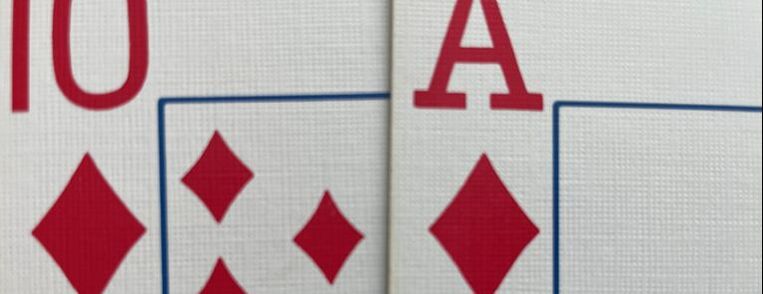 My friend was explaining his new system for beating the house at blackjack and the dealer did his best to keep a straight face. The explanation took a long time and I think he mentioned paradigms and stochastic chains more than once, but the gist of it was crystal clear. Since the odds of winning/losing at blackjack are close to 50/50 for good players, he would essentially double his bet after a losing hand and halve his bet after a winning hand. Now, everyone knows the odds of heads or tails in a coin flip are 50/50, but everyone also knows that coin flips don’t alternate heads/tails/heads/tails in a set pattern. For my friend, though, this was exactly the pattern he was counting on as his path to huge winnings. I forget the exact words, but the dealer said, essentially, “That’s a Number Three,” as if it was one of the “systems” so basic that it counted among the top trio that would-be winners brought to the table. My friend insisted it was more sophisticated, but I’d side with the dealer on this one. Maybe it’s some movie we watched as kids or maybe it’s the same hubris that screwed things up for Icarus, but we all seem to think we can handle situations better than the people who deal with them on a daily basis. Paradoxically, we seem to be most confident of our abilities in the areas we know the least. We know more about baseball than the manager who’s running the team and we know more about medical science than the people with 27 initials after their names. We know more than the generals who lead our troops, more than the cops who patrol our streets, more than the dealer at the blackjack table… One reason we think we could do their jobs better is that we only focus on their screw-ups, and only in hindsight. Whether they’re updating the voice mail system (to serve YOU better) or fighting pandemics or solving crimes, our top professionals treat us to daily flood of bonehead moves. We don’t pay much attention when they get things right, since that is their actual job. It’s pretty much invisible, as it should be, when the calls go through, the drugs don’t kill people and the cops get the right guy. When the trains derail, though, we know exactly how we would have handled it better, even if we have no idea how to handle it at all. We skip over the 500 steps and the 4,000 details they handled right and fixate on the big, gaping, neon-lit boner that will define their legacies. That’s fair, in a way, since it goes with the territory for people who want to be paid and respected for their expertise. Particularly for those of us who follow their guidance, most of the time, relentless mockery is the tradeoff we demand for following them down the wrong path. Still, we give ourselves much too much credit when we think we can do all the complex jobs better than the people who do them every day. Whether it’s a blackjack dealer or a cop or a short-order cook, being in the business provides a degree of insight that our occasional visits cannot match. Every so often, I’ll read some article about young people having an inflated sense of their talents, which almost invariably leads to a discussion of the participation trophies they received as children. The writers usually make a compelling case about all those Gen-whatevers, but I can’t help but wonder about the same flaw in older, but not wiser, folks like me. What’s our excuse? You should never split a pair of Kings, but it’s always a good idea to subscribe to Dad Writes by clicking right here, or right here, or right here.
1 Comment
David Brimm
11/16/2021 01:59:46 pm
The odds are great that a new Dad Writes column is forthcoming.
Reply
Leave a Reply. |
Who writes this stuff?Dadwrites oozes from the warped mind of Michael Rosenbaum, an award-winning author who spends most of his time these days as a start-up business mentor, book coach, photographer and, mostly, a grandfather. All views are his alone, largely due to the fact that he can’t find anyone who agrees with him. Archives
January 2024
Categories
All
|
 RSS Feed
RSS Feed